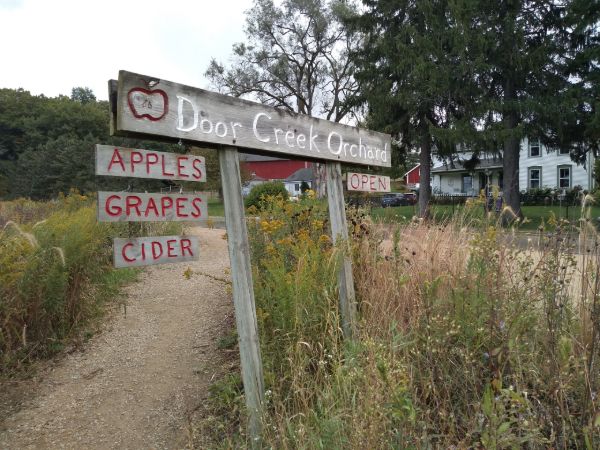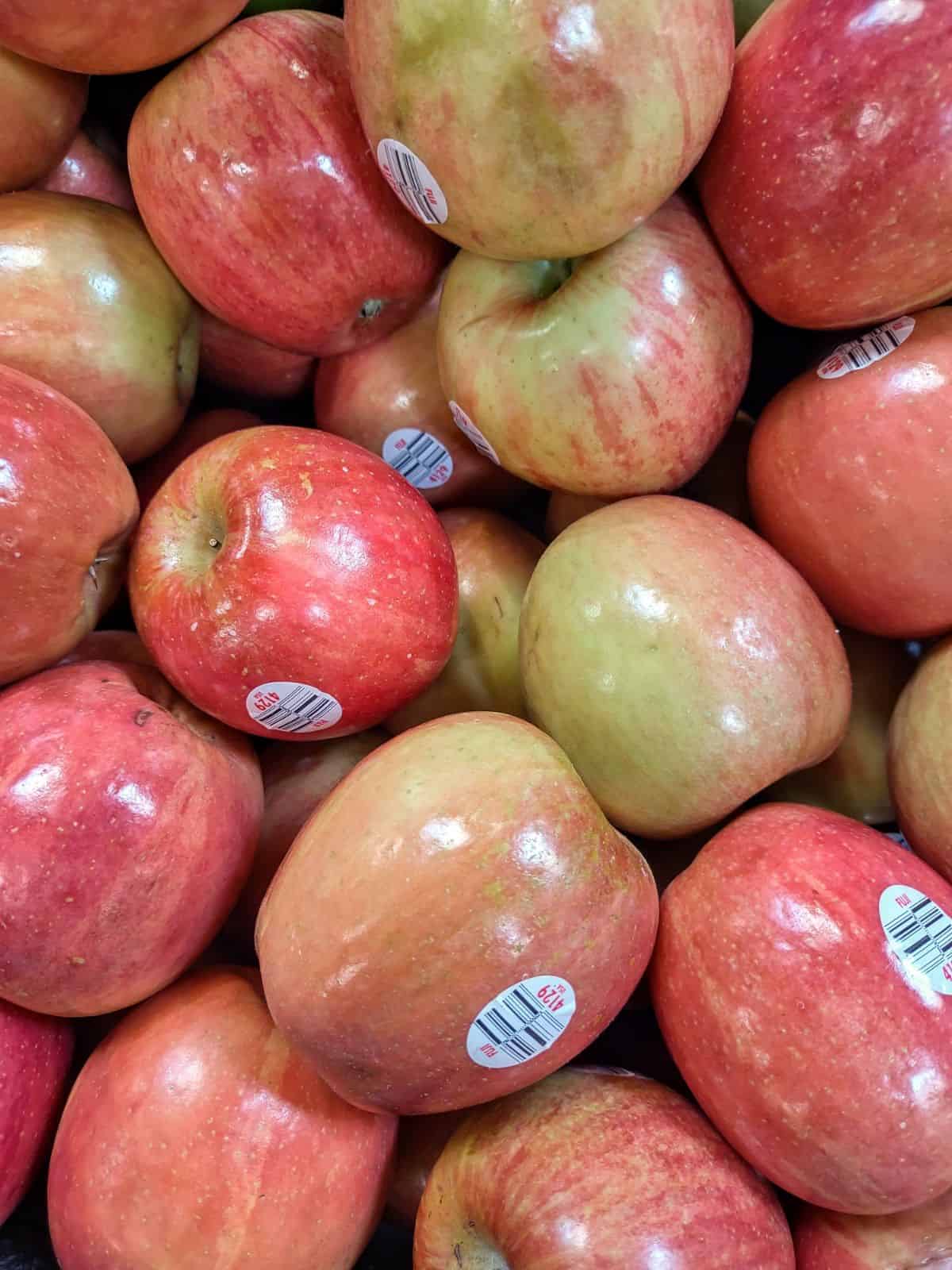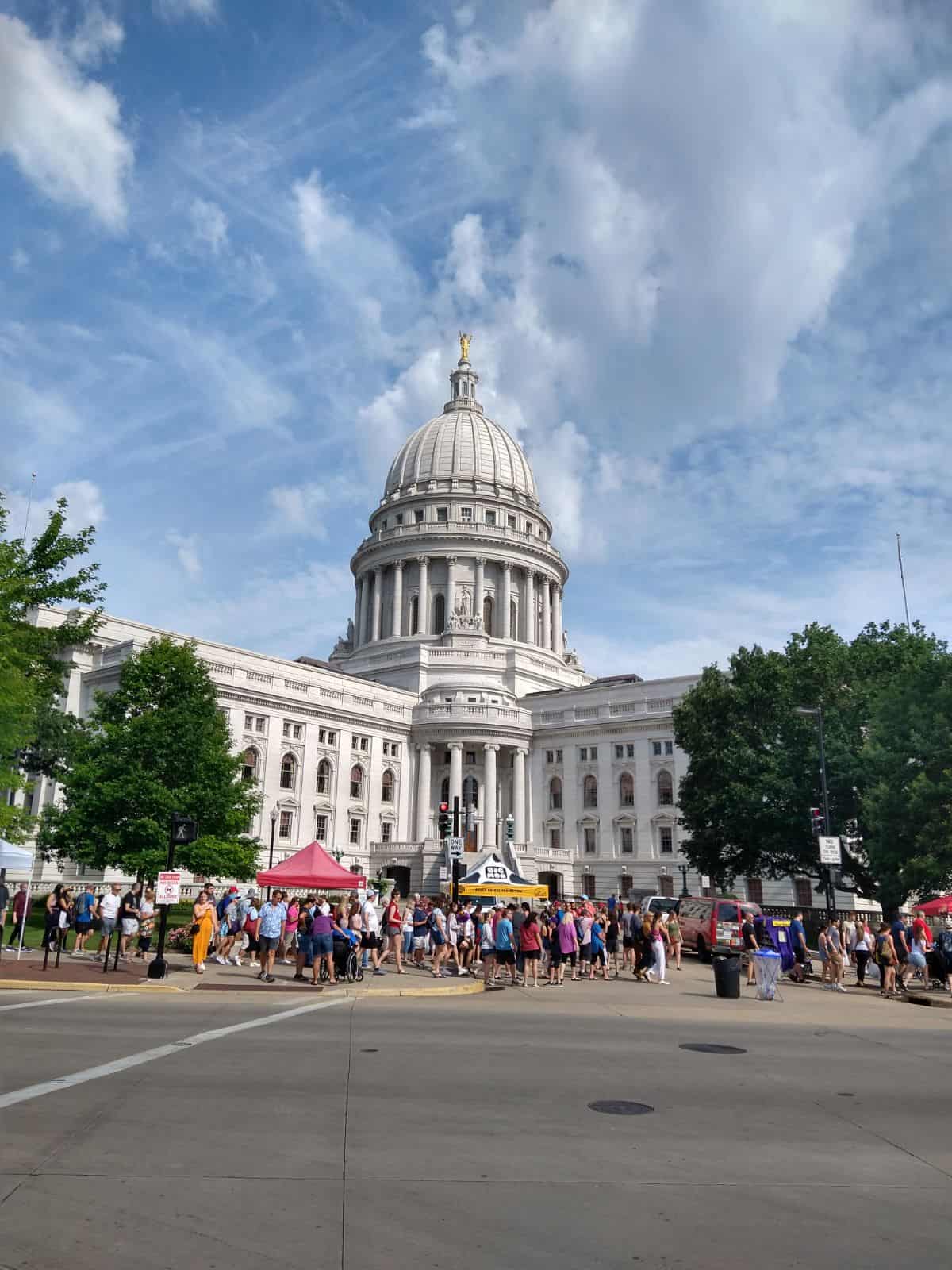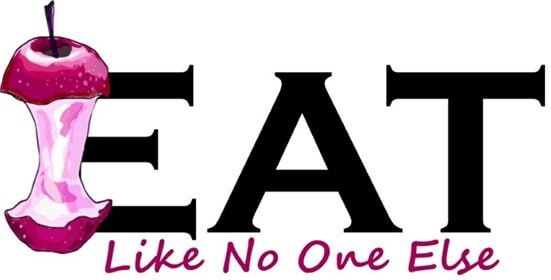Are you planning to head out to your local apple orchard to pick apples this fall? Well before you do, you need to take a listen to this episode. I have my friend Liz from Door Creek Orchard in Wisconsin on to give her tips on what to know before you head out to an orchard.
Jump to:
🎧 Listen
You can listen to this podcast episode below or listen on any of these podcast players - Spotify, Apple Podcasts, Amazon Music, Google Podcasts. If you would prefer to read the text, you will find a transcript below.
📜 Read
Here is a transcript of the interview with Liz from Door Creek Orchard.
Eric: Hey everybody, welcome to the Eat Shop Waste Not podcast. I'm excited that it is my favorite time of year. We are getting, we're in September. We're thinking about, um, cooler weather and definitely apples are on the mind for me. Constantly all the time. I love this time of year for just being able to get this so many amazing apples. And definitely my favorite thing to do is to go to as many apple orchards as possible because I think there is nothing like being able to go on a crisp fall day and pick your own apples get some cider get some donuts. Um, but before you head out to do that this year, I thought I would share with you some quick tips, but not from me.
I wanted to bring on an expert. Um, so today I have Liz from Door Creek Orchard, just near Madison, Wisconsin, on the podcast and she's going to share with you some great tips before you head out to pick your apples this year. So Liz, welcome to the podcast.
Liz: Thank you so much. Thanks for having me on. Excited to be here.

🍏 Door Creek Orchard
Eric: Um, so before we get into your tips here, just give us a brief little rundown of who you guys are, where your orchard's at, and all that kind of fun stuff.
Liz: Sure. Well, like you said, we're right outside of Madison, Wisconsin, about 11 miles from the capitol, so it's a pretty awesome location for us. Um, we are an 80 acre farm, only about 8 of that acreage is in fruit, but we grow... 90 ish varieties over those eight acres of fruit. Uh, that's what we love to do here is grow unique varieties that people maybe have never heard of or tried and, uh, introduce them to those apples.
So, um, we also do do some pick your own on some of the more mainstream apples that we have, uh, larger quantities of. And we have some pears, grapes, some other interesting fruit, quince, pawpaw, American persimmon, things like that in small quantities, so, um, we're just fruit people all around. Um, and yeah, we are right, uh, I think this is our, gonna be our fourth weekend of pick your own coming up this weekend. So we are in it. We are in apple season.
Eric: That is great. Yeah. I got to go visit Liz out there. Um, unfortunately it was during 2020. So, we got to walk around with masks on. So it's nice to actually see her full face this time.
Liz: Yes.
🎧 Door Creek Orchard is one of the apple orchards featured in our Most Charming Apple Orchards list.

💡 What to Know Before You Pick
Eric: So, yes, Door Creek is a really fun orchard. She gave me a great, a great tour and we got to see all her wonderful varieties here.
So, so I wanted to ask you, um, so before people head out to the orchard here, what are some tips you want to give people? When they're going to go, you pick Appling this year.
Liz: Yes. So, uh, first of all, we're so excited to see you. We have been here on the farm growing apples, your apples for the past year. It's a year round process. We start in the winter by pruning the trees and then it kind of snowballs the work, literally in the winter, as the snow is melting to, um, you know, training, monitoring, watering, doing so many things to make sure that you get great apples.
Uh, so we've been working hard all year and we're just excited to see you and share the fruits, literally the fruits of our labor with you. Um, and actually, apples set their fruit the year before for the next year. So we are also thinking about your apples for the next year too while we're growing. So, uh, that I just wanted to mention.
Uh, and then also just remember if you're going out to pick your own, you are going to be in nature. So think about. Shoes, good shoes, you're out there walking in the grass, uh, good clothes, so layers maybe, or a raincoat or something if rain's gonna be threatening, um, bug spray if it's a kind of a buggy year, and a water bottle, always a good idea to stay hydrated when you're out there, um.
Yeah, so that's another thing I just wanted to mention. Um, also, lots of different kinds of apples, right? You and I both, this is one of our favorite things about apples. So many different kinds. And they all have their own personalities. The way they grow on the tree is different. The way, the different management that each variety gets when they're growing is different.
Um, and then, they each have their own taste profile, right? Texture, taste, all totally different. And with that comes the apples. Storage differences as well. So, right now, we are just talking about Zestar. Awesome early season variety. Right? We started picking Zestar a couple weeks ago. They're super crispy right off the tree.
Really great fresh eating apple for those of you who like crispy apples. Round about now, even under refrigeration, they start getting a little less crispy. So, just remember, apples are, they are a perishable item.
Always keep them in the fridge. Always. I know they look pretty in a bowl on the table, but always keep them in the fridge.
Um, and just know that, you know, some varieties are going to keep longer than others. Um, doesn't mean anyone did anything wrong. They just, they don't keep forever. I mean, there's some late season apples that can keep just under normal refrigeration all the way through the winter. into spring for you. Um, they generally are those later season varieties, um, but not all of them.
So you just, you can ask the farmer, they should know, you know, what's going to keep better. And again, always keep them in your fridge.
Eric: Yeah. Great tips. I think sometimes people don't realize that sometimes, like, you get an apple, like the Zestar, that's not going to be as good as crispy board. And then, you know, it's not like, it's like the farmer's fault that the apple would go. It's just like that.
That's just some of those things I hear. And it just depends on the time of year. That's why I like, I like to suggest to you for people is, if you can, maybe plan two trips out to the orchard. If we're able to do that here, get two trips out there. Maybe you go earlier in the year to get certain varieties here.
Cause right now, everyone loves Honeycrisp. So this is the time for Honeycrisp. Um, so you want to do that. Um, but maybe later in the year you want to go and pick some other apples that are going to be longer storage so that you can have that supply that goes on beyond, you know, the fall season if you have refrigerator space, maybe, you know, you can store some a bit longer. So, I try to kind of balance out, maybe not do like 1, if you're going to like, I don't want to buy so many at once here for the whole season.
We'll just, if you can, maybe go twice as you get, you know, different varieties to go.
Liz: Right. Absolutely. And, you know, when you're out there, maybe earlier in the season, talk to your farmer and say, Hey, I'm interested in these more storage varieties that are maybe going to be coming, you know, mid to late October. Um, what would you recommend and when would you estimate that those might be ready so I can know when to stop back and they should be able to give you an estimation.
Now, again, it's an estimation,
Eric: Yes.
Liz: know, we're still dealing with nature and plants and, um, there's, there's nothing exact about. Uh, knowing when things are going to be ripe and ready to go, but they can give you some sort of window of time. And if they have a website too, it might even be on there in some sort of loose way when they think those storage varieties might be available, for sure.
Eric: Yeah. And it's of course going to be different too, depending on where you are in the country. I mean, if you're just looking online, I have a resource looking up an Apple and just saying, okay, it's right this time of year, while that all depends on where in the country you are, it could vary greatly.
And what type of year you had, um, you know, some places may be ahead of schedule. Um, I'm out in Utah right now and this year they're running behind schedule. It was a colder spring. So things are now going, going a little bit later. So it's best if you can. If you have some apples looking for, maybe look online as kind of like a guide to see like, okay, when this may ready.
And then directly, you know, call the farm and try to talk to them or, or, I mean, you have a great Instagram presence. So if you're going to her farm, you know, she's on there always posting things, um, she even tells you like what type of apples are in the cider that they're pressing her. So, you know, that's really cool.
I always kind of like that.
Liz: Thank you. No, I mean, we, we get a lot of people who want to do home hard cider, who really want to know what's in the cider each week. So that's one of the reasons I try to do that. And plus, I just think it's interesting and fun to know.
Eric: Yes. And the keep in line too, like if you're going to buy cider, it can change throughout the season as well.
Liz: Oh, absolutely. The taste profile of the cider, because of those different varieties as we're going throughout the season, it generally goes from lighter and tarter to more heavy. Texture and sweet. That's generally the, the taste profile and body progress as you go throughout the season. But again, it's going to vary from farm to farm because people grow different things, so.
Eric: Exactly. I've been, so some farms like to do, we were, we were, before we had on this podcast, we were talking about Scott Farm out in Vermont, and they actually put, um, they grow their own ginger and put that in the cider. And that was just like, oh. That is so good.
Liz: I wish there was some way to ship that over here because I, I know you can do that too and I would love, I would love to try that someday, so.

🍎 Favorite Apple Varieties
Eric: So this is where we, um, wrap this thing up here. Thanks for all the, um, wonderful tips there. Can you take a moment to just do a little love letter to some of your, um, what are some of your favorite, um, apple varieties?
Liz: Yes, uh, usually, oh, I have so many that I love, but if pressed, my favorite variety is Ashmead's Kernel, which is an heirloom variety. It's a Russeted, it's in the russet family, uh, ripens around October 1st, most years, and I just love it. I just, it's usually my favorite. That's. Yep, that's my top one. I also really like, Esopus Spitzenberg.
That's another heirloom, later season. And, uh, Calville Blanc d'Hiver, I like a lot. Um, for a modern style apple, I really like Crimson Crisp. That's one of my favorite more modern, modernly developed ones. Um, what about you? What are your tops? I know,
Eric: hmm. You know, like, you know, it's hard. It's like picking your favorite kid almost, too. . Yeah. I also like the, like the russet apples. Um, actually, it's a little, little hard for me. I prefer some of the other, other russet ones here. Um, I like Chestnut Crab.
Liz: Oh, they're so good.
Eric: are so good.
Liz: right now. Those are so good.
Eric: they're so good.
I like, uh, they're, they're a small. I've talked to the podcast, they're a small apple, but they're larger than when you think of crab apples and they actually have sweetness to them and they have like the sweet nutty flavor. And I, I actually, I love the skin of apples.
Um, my mother in law who might be listening to this year. Um, she hates the skin of apples here. So we're complete opposites in that. I love the, the skins. I think sometimes I've, I've picked up skin. She's peeled off. Okay. But yeah,, I love those, um, type of like russet type apples, um, I love snow sweets and the one, one I really like, um, you know, many Rubinette, it's, uh, one of those, um, Really rich flavored apples that like people sometimes think are ugly, but I think some of the heirlooms that are pretty when they have, you know, cause I think we expect to see that like red, delicious looking, perfect red apple in the grocery store that we all know tastes terrible.
Um, but like, like Rubenette, it has all these like different shades of like oranges and some russeting and stuff here sometimes, you know, and also depending on the orchard too, like, cause apples can look different depending on. That's another thing that people may not realize is that, like, depending on the, you know, weather and things here that could change, you know, cause we're, we grow apples all over this country.
🎧 To learn more about apples you will want to try see check out our episode - Apples Worth Searching For.

🌳 Different Types of Popular Apples
And, you know, in some places like on Utah here, where I'm at now, it's, it's not humid here, uh, Midwest, it's going to be humid, you know, there's going to be no different, you know, sort of factors. So even the same apple can look slightly different. And I don't think people always realize that even like with like Fuji apples, for example, we've seen, I've seen recent years that you, you find, different strains of Fuji apples.
So there's some that are ripening in September.
Liz: Yes, so, uh, within the more popular varieties, they've designed different, versions within that variety. So, yes, Fuji, there's different kinds of Fuji, there's different kinds of Cortland, there's different kinds of Macs, um, there's different kinds of Red Delicious. Not that really we care, but there are. So, um, yes, absolutely.
Just to make things even more confusing, there are different kinds. And generally they were being bred to either be more red or yes, ripen at a different time. I mean, Fuji takes a really, it takes a really, really, really long growing season. So traditionally I couldn't grow a Fuji for most of the time we've had this orchard, but they have come out with one called Daybreak Fuji, which has a shorter ripening time.
So now I can grow Fuji. And sell it to you without it freezing on the tree before it's ripe, so.
Eric: Yes. Again, that's, that's the challenge that comes to obviously with the different weather. If you have your seasons cool, you know, you get that frost first frost earlier, that's going to affect things for sure. So this was great getting to talk to you guys. I hope everyone, you know, if you're in Wisconsin, um, , or you just need to go and think I need to fall vacation somewhere, you should just totally go to Wisconsin and, and, and get some apples and of course, you know, tons and tons of fresh cheese curds, um, when you're at it, they go well together, that's a good combo.
Liz: Thank you.

Eric: Um, so yeah, Madison's a very beautiful city. Love the farmer's market. There is this fantastic. I'm not, obviously you probably never get to make it out there. Cause you're stuck at your orchard.
Liz: I do get to go during the spring and summer. It's an incredible farmer's market. I think it's the best in the country. I'm biased, of course, but it's pretty great.
Eric: it's my favorite. I've been all over the country, so I don't, I'm not biased. So I get to see confirm that she is correct. All right, Liz, thank you so much for coming on and, um, have a great apple season, everyone.
Liz: Thank you.
🎧 More Apple Episodes
If you enjoy this episode, here are some other apple episodes you need to check out -


Leave a Reply